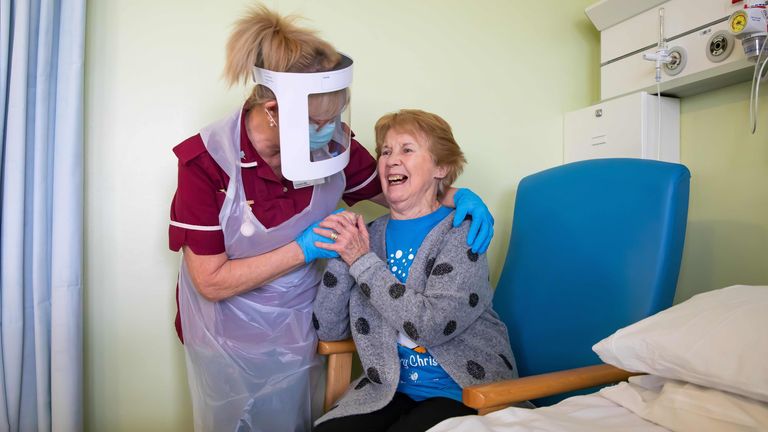Public Health England (PHE) has said it does not recommend mixing COVID-19 vaccines from different suppliers.
The warning comes as distribution of the Oxford/AstraZeneca vaccine is due to start in the UK next week, the second roll-out following the launch of the Pfizer/BioNTech vaccine in December, with both requiring two doses.
On New Year's Eve, the UK government issued guidance to NHS medics saying that if a person who has received their first jab goes back for their second but the same type is not available, or the first vaccine type is unknown, then it is "reasonable" to offer a dose of another vaccine.
Follow live COVID-19 updates from the UK and around the world here
"This option is preferred if the individual is likely to be at immediate high risk or is considered unlikely to attend again," the guidance adds.
After questions were raised about the risks, Dr Mary Ramsay, head of immunisations at PHE, told Sky News that mixing is not recommended and should only happen on "rare occasions".
"We do not recommend mixing the COVID-19 vaccines - if your first dose is the Pfizer vaccine you should not be given the AstraZeneca vaccine for your second dose and vice versa," she said.
"There may be extremely rare occasions where the same vaccine is not available, or where it is not known what vaccine the patient received.
"Every effort should be made to give them the same vaccine, but where this is not possible it is better to give a second dose of another vaccine than not at all."
Each of the approved vaccines uses different technology to induce an immune response to COVID-19.
The Pfizer vaccine uses mRNA technology - a first for a vaccine - which introduces into the body a messenger sequence that contains the genetic instructions for the vaccinated person's own cells to produce the antigens and generate an immune response.
The Oxford vaccine uses the same technology as other vaccines by introducing the coronavirus gene into human cells to make the unique COVID-19 spike protein which the immune system builds up a response to if the real virus enters the body.
Dr Simon Clarke, associate professor of cellular microbiology at the University of Reading, said mixing the vaccines without any data is a "huge gamble".
"It's completely unproven, while it might work it also might not," he told Sky News.
"The consequences for getting this wrong are huge, this is the most important thing in the world right now.
"It could mean the whole vaccine programme failing just as we have this new variant. The chances that it won't work are really, and nobody knows."
Dr Julian Tang, a consultant virologist at Leicester Royal Infirmary, said there is a plan to test mixing the vaccines but does not think it is a major issue as vaccines are often mixed between doses.
"We do this quite a lot anyway, especially with the child immunisation programme," he told Sky News.
"My son got one type of pneumococcal vaccine (pneumonia) then another one for the booster and it was fine.
"Busy healthcare workers often get a different type of vaccine for their booster as they forget or are too busy.
"Hepititis B vaccines are regularly different because they are given years apart but this does not stop them working."
Dr Tang said he understands why people would be concerned about the Pfizer and Oxford vaccines using different technology.
"But actually, the vaccines aren't that different, they both induce the immune response for the spike protein," he said.
"I think the risk of people getting the virus before they're vaccinated and then dying is higher than mixing vaccines.
"If it's MHRA and government sanctioned it should be ok - I don't always agree with them, but on this I do."
He added that the US may be more wary of this approach because the medical legal risks are much higher than in the UK.
https://news.google.com/__i/rss/rd/articles/CBMib2h0dHBzOi8vbmV3cy5za3kuY29tL3N0b3J5L2NvdmlkLTE5LW1peGluZy1jb3JvbmF2aXJ1cy12YWNjaW5lcy1pcy1ub3QtcmVjb21tZW5kZWQtaGVhbHRoLWFnZW5jeS13YXJucy0xMjE3NzMyMNIBc2h0dHBzOi8vbmV3cy5za3kuY29tL3N0b3J5L2FtcC9jb3ZpZC0xOS1taXhpbmctY29yb25hdmlydXMtdmFjY2luZXMtaXMtbm90LXJlY29tbWVuZGVkLWhlYWx0aC1hZ2VuY3ktd2FybnMtMTIxNzczMjA?oc=5
2021-01-02 12:08:31Z
52781275240124


Tidak ada komentar:
Posting Komentar